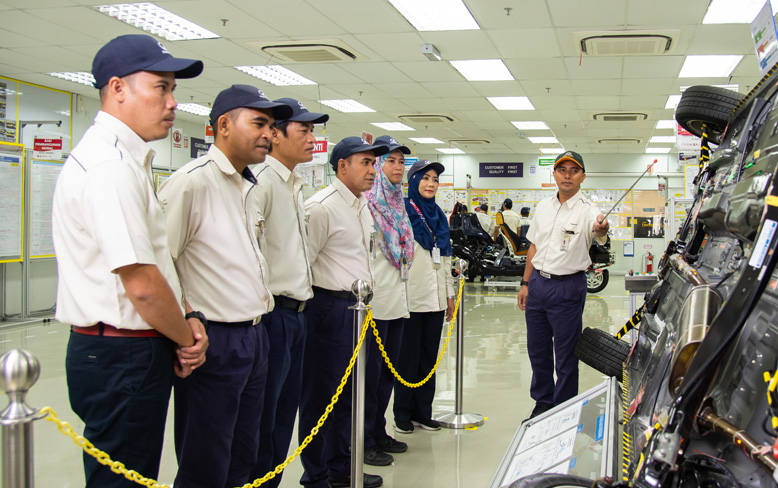Introduction
The Malaysian automotive industry ranks third among Southeast Asian countries. Its annual output exceeds 500,000 vehicles making the country’s economic position stable and prospering (Fernando et al., 2021). Malaysia has its own car company – Proton, and in the early 1990s, a second one was created – Perodua (Adetunji et al., 2018). This is what brought the country to the 11th line in the world ranking for the production of cars from the very beginning to the end. Having numerous plants across the country is vital to sustaining a large number of personnel. Hence, this paper will focus on human resources management in the Malaysian automobile industry in terms of Hofstede’s categories of culture.
Personnel Management and Hofstede Theory
Personnel management is one of the primary factors affecting organizational success, especially at large manufacturers. When conducting business with a foreign partner, it is vital to remember that each culture contains a number of critical elements – cultural categories (Noor et al., 2019). One of the most well-known classifications of business cultures was proposed by the Dutch scientist Geert Hofstede. The following part of the paper will focus on different dimensions of culture in the business context, specifically in personnel management.
Power Distance
To begin with, Malaysia has the highest score on power distance. It signifies that at work in countries with an increased distance of power, inequality serves as the basis of hierarchy in relationships: a subordinate and a boss cannot initially be equal (“What about Malaysia?”, n. d.). It is traced in human capital management – managers directly tell their subordinates what to do without asking them for an opinion. Such a way of managing the personnel is typical for Malaysia because its residents are born in traditional patriarchal families. The results of high power distance are visible as the GDP in Malaysia is the highest in Southeastern Asia (Arumugam, 2020). In the automobile industry, it helps structure the working processes and present high-class products.

Collectivism
The other cultural peculiarity of Malaysia is its collectivistic nature. It implies that people pursue common goals and value their membership in a community (“What about Malaysia?”, n. d.). This is an incredible trait regarding human resource management as such individuals are easy to unite by a common goal. For example, in Perodua, the automobile company, managers strive to make collective contributions to vehicle production and promotion by stating the importance of investing in the country’s economy collectively (Arumugam, 2020). Such an approach provides better and more tangible results.
Femininity and Uncertainty Avoidance
The country supports such values as caring for one another and boosting the quality of life, meaning it has a feminine nature. In business, it signifies that people are indirect; for example, a manager can hint at their subordinates’ drawbacks to their jobs so as not to be rude. With regard to uncertainty avoidance, the country has a low score, meaning that the employees and employers can fix the operating agreements and be as less upfront as possible. In the automotive industry, for instance, in Proton company, the employee retention rate is reported to be less than in any other local company for the last few years (Basheer et al., 2019; Zainal et al., 2022). It is a sign that human resource management works effectively to mitigate employment-related issues.
Orientation
Malaysia is a normative culture with a long-term orientation which means it values its centuries-established traditions. In the automobile industry, Malaysians appreciate the quality and reliability of the products they issue. In addition, their commitment to long-lasting customs is expressed by highlighting key traditional peculiarities. For instance, in 2022 “Perodua chose to highlight a unique Peranakan tradition – that of opening the main door first thing on Chinese New Year day to usher prosperity into the home” (Hadi, 2022, para. 1). Such a way of celebrating lasting values is a sign of dedication and promotion of cultural importance.
Conclusion
In summation, Malaysia is different from the European countries in a business context. The latter ones are individualistic, with a focus on establishing equality among employers and employees. When speaking about being direct, most European countries prefer being open during the negotiation process, unlike Malaysians, who prefer non-verbal communication. Finally, the Europeans are oriented on relying on present conditions, sometimes disregarding their history and tradition, when running a business.
References
Adetunji, R., Rashid, S., & Ishak, M. (2018). Consumer-based brand equity (CBBE) and the role of social media communications: Qualitative findings from the Malaysian automotive industry. Journal of Marketing Communications, 25, 1-24. Web.
Arumugam, T. (2020). Employee engagement and retention in automotive industry in Malaysian context. Job stress as a moderator. International Journal of Engineering and Advanced Technology, 8, 607-617. Web.
Basheer, M., Hameed, W., Rashid, A., & Nadim, M. (2019). Factors effecting employee loyalty through mediating role of employee engagement: Evidence from PROTON automotive industry, Malaysia. XIII, 71-84.
Fernando, Y., Tseng, M., Sroufe, R., Abideen, A., Shaharudin, M., & Jose, R. (2021). Eco-innovation impacts on recycled product performance and competitiveness: Malaysian automotive industry. Sustainable Production and Consumption, 28, 1677-1686. Web.
Hadi, R. (2022). A Peranakan tradition becomes inspiration for Perodua and SPIN. Marketing. Web.
Noor, W. S. W. M., Fareed, M., Isa, M. F. M., & Abd. Aziz, F. S. (2018). Examining cultural orientation and reward management practices in Malaysian private organizations. Polish Journal of Management Studies, 18(1), 218–-240. Web.
What about Malaysia? (n. d.). Hofstede Insights. Web.
Zainal, N. S. B., Wider, W., Lajuma, S., Ahmad Khadri, M. W. A. B., Taib, N. M., & Joseph, A. (2022). Employee retention in the service industry in Malaysia. Frontiers in Sociology, 7, 928951. Web.